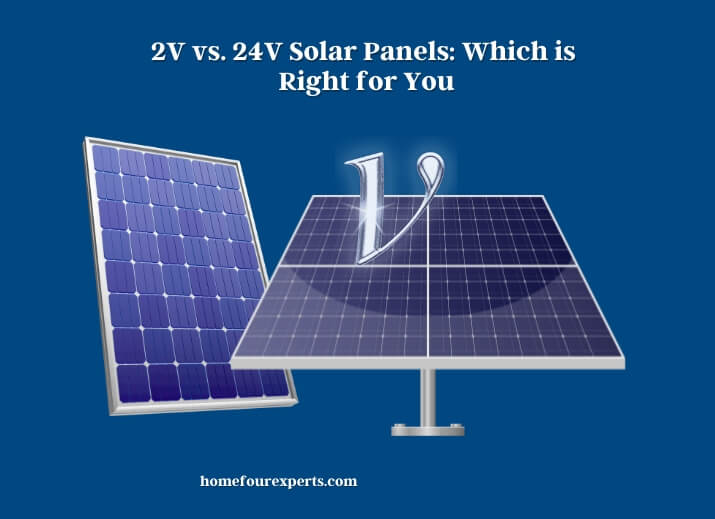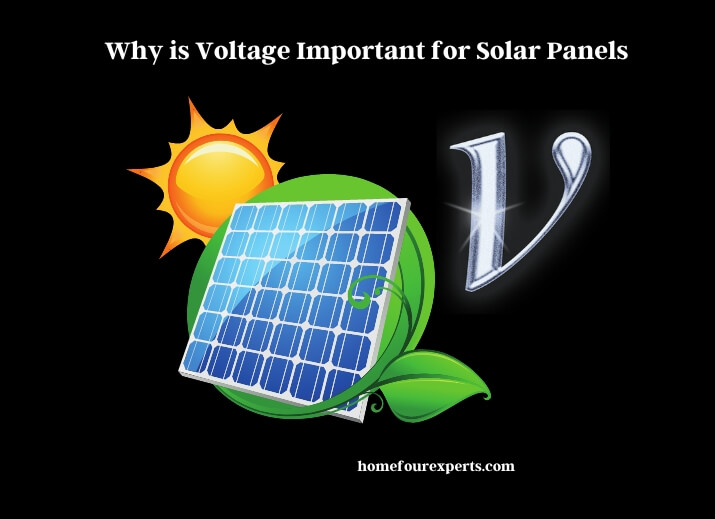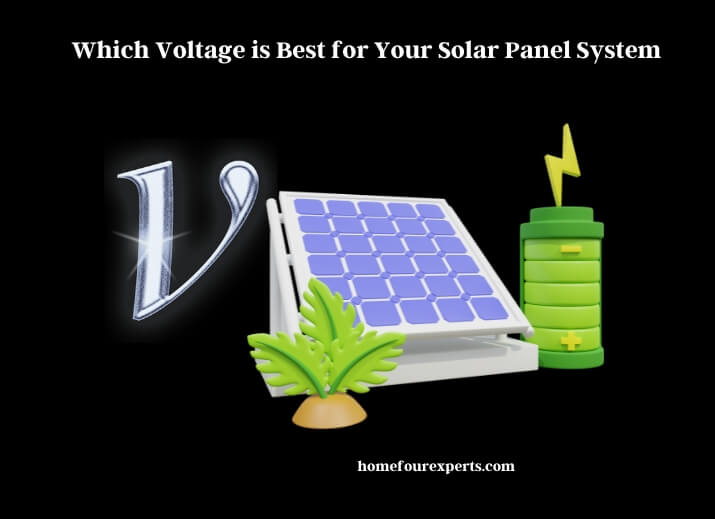Solar energy is becoming increasingly popular as a clean and renewable energy source, and with good reason. Not only does solar energy help reduce our dependence on non-renewable sources of energy, but it also helps reduce our carbon footprint and lowers our energy bills. One of the key components of a solar panel system is the solar panel itself, and understanding the voltage of the solar panel is essential for system design and performance.

The voltage of a solar panel depends on its construction and the number of cells it contains. Solar panels are available in different voltage options, including 12v and 24v, which can affect the efficiency and effectiveness of the entire system.
Why is Voltage Important for Solar Panels?
Voltage is an important factor to consider when designing a solar panel system because it affects the overall performance and efficiency of the system. The voltage of a solar panel is determined by the number of cells it contains and its construction. The cells within a solar panel generate electricity through the photovoltaic effect, where sunlight causes electrons to move between different layers of the panel, creating an electric current.

Matching the voltage of the solar panel with the other components in the system, such as charge controllers, inverters, and batteries, is crucial for ensuring the system functions properly. For example, if the voltage of the solar panel is not matched with the battery, the battery may not charge efficiently or may become damaged. Similarly, if the voltage of the solar panel is not matched with the inverter, the inverter may not be able to convert the DC power produced by the solar panel into usable AC power for the home or business.
Choosing the correct voltage for your solar panel system will ensure that all the components work together seamlessly, maximizing the efficiency and effectiveness of the system. It is also important to note that the voltage of a solar panel affects its power output, and higher voltage panels generally produce more power.
Details About 12V Solar Panels
12V solar panels are a common option for solar panel systems, particularly for smaller systems such as those used for camping, RVs, and boats. These panels typically have 36 cells and produce a voltage of around 17-18V, which is then regulated by a charge controller to 12V to charge a battery bank.
One of the benefits of 12V solar panels is that they are generally more affordable and accessible than higher voltage options. They also require less wiring and can be connected directly to a 12V battery without the need for additional components. This makes them a popular choice for smaller systems that require less power, such as lighting or small appliances.
There are some limitations to using 12V solar panels. They produce less power than higher voltage panels, which may limit their effectiveness for larger systems that require more power. If you use 12V panels may require thicker wires and fuses to handle the increased current, which can add to the overall cost of the system.
The Explanation for 24V Solar Panels
24V solar panels are another common option for solar panel systems, particularly for larger systems such as those used for residential or commercial buildings. These panels typically have 72 cells and produce a voltage of around 35-37V, which is then regulated by a charge controller to 24V to charge a battery bank.
One of the benefits of 24V solar panels is that they produce more power than 12V panels, making them more effective for larger systems that require more power. They also require less wiring and can be connected directly to a 24V battery without the need for other factors. This makes them a popular choice for larger systems that require more power, such as powering a home or business.
Using 24V solar panels may require ther components, such as a larger charge controller, to handle the increased voltage and power output. They may also require thicker wires and fuses to handle the increased current, which can add to the overall cost of the system.
Which Voltage is Best for Your Solar Panel System?
Determining which voltage is best for your solar panel system depends on several factors, including the size of the system, power requirements, and compatibility with other components.

For smaller systems, such as those used for camping, RVs, and boats, 12V solar panels can be an effective and affordable option. They require less wiring and can be connected directly to a 12V battery without the need for other factors. 12V solar panels may produce less power than higher voltage options, which may limit their effectiveness for larger systems that require more power.
For larger systems, such as those used for residential or commercial buildings, 24V solar panels are often a better choice. They produce more power than 12V panels and require less wiring. Using 24V solar panels may require other components, such as a larger charge controller, to handle the increased voltage and power output.
When selecting the voltage for your solar panel system. The voltage of the solar panel should be compatible with the charge controller, inverter, and battery bank. Mismatched voltages can lead to inefficient charging or damage to the components.
Consider your budget when selecting the voltage for your solar panel system. Higher voltage panels may require other factors, such as larger wires and fuses, which can add to the overall cost of the system.
If you want to know what is the difference between solar batteries and rechargeable batteries? Here is the reply.
Difference Between 12V Solar Panels and 24V Solar Panels
Here is a table summarizing the main differences between 12V solar panels and 24V solar panels:
| Point | 12V Solar Panels | 24V Solar Panels |
| Voltage | Produces around 17-18V | Produces around 35-37V |
| Number of cells | Typically 36 cells | Typically 72 cells |
| Use | Commonly used for smaller systems, such as camping, RVs, and boats | Commonly used for larger systems, such as residential or commercial buildings |
| Power output | Produces less power than 24V panels | Produces more power than 12V panels |
| Wiring | Requires less wiring than 24V panels | Requires less wiring than 12V panels |
| Compatibility | Compatible with 12V battery banks and charge controllers | Compatible with 24V battery banks and charge controllers |
| Additional components | Generally does not require additional components | May require additional components, such as a larger charge controller |
| Cost | Generally more affordable than 24V panels | May be more expensive than 12V panels due to additional components |
The best option for your solar panel system will depend on your individual needs and circumstances, and this table is meant as a general guide to the differences between 12V and 24V solar panels.
Last Assumption
The voltage of solar panels is an important consideration when selecting the best option for your solar panel system. 12V solar panels are typically used for smaller systems and are more affordable, while 24V solar panels are commonly used for larger systems and produce more power.
When selecting the voltage for your solar panel system, it’s important to consider the size of the system, power requirements, compatibility with other components, and budget. Mismatched voltages can lead to inefficient charging or damage to the components.
The best voltage for your solar panel system will depend on your individual needs and circumstances. Whether you choose 12V or 24V solar panels, make sure to select high-quality components and work with a reputable solar installer to ensure that your system is installed safely and effectively. With the right components and proper installation, a solar panel system can provide a sustainable and cost-effective source of energy for years to come.
About This Writer

Hi, I am responsible for the 'Homeowners Power Solutions' category. My name is Liam Jaxon and a licensed technician with 7 years of experience in vehicle batteries, electrical gadgets, and home appliances. My working experience in different residential & light commercial electrical sectors and the automobile industry helped to acquire vast knowledge in this industry.